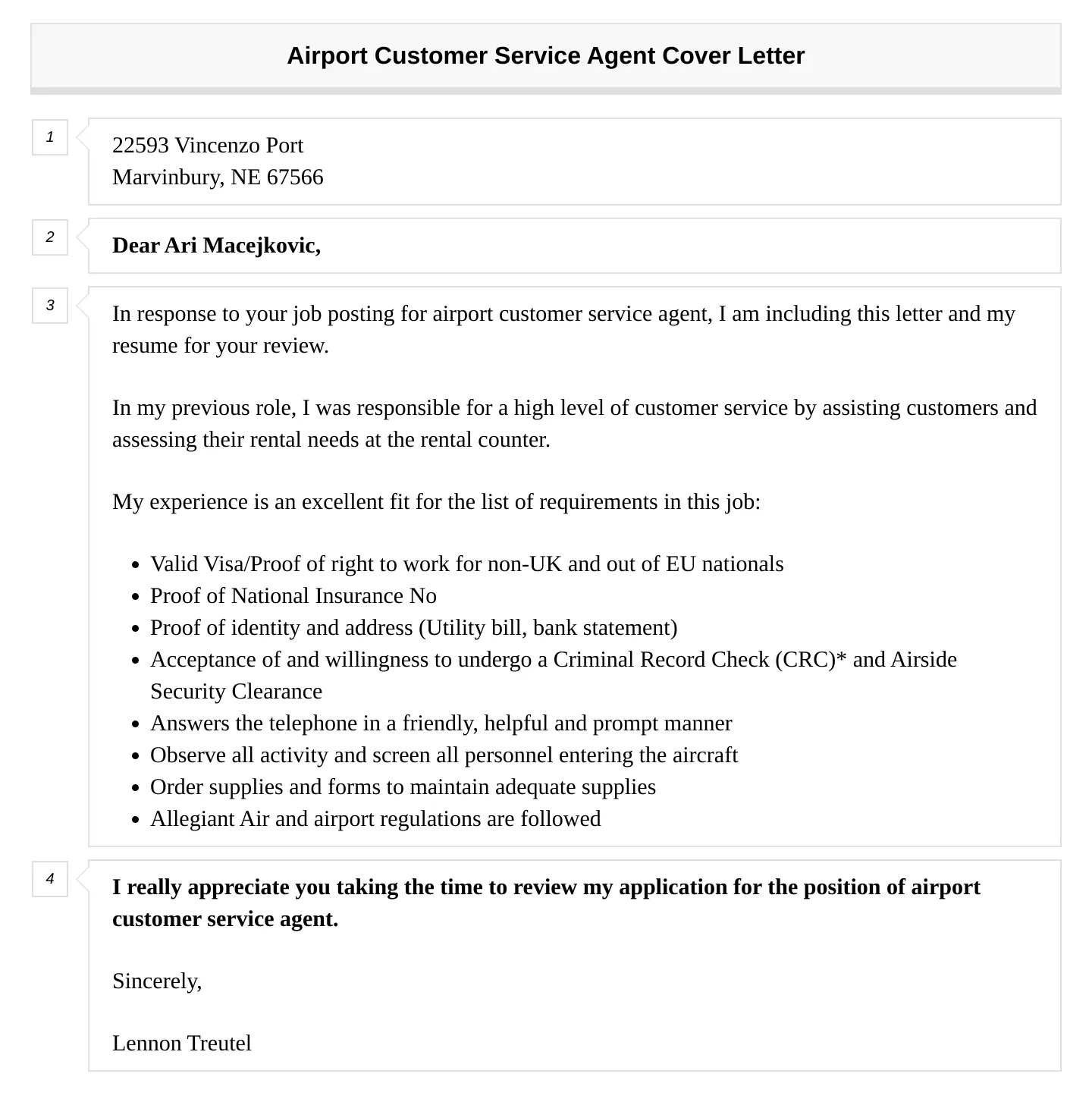Why a Stellar Cover Letter Matters for Airline Jobs
In the competitive world of airline customer service, a well-crafted cover letter can be your golden ticket to securing an interview. It’s the first impression you make on a hiring manager and a crucial opportunity to showcase your personality, skills, and enthusiasm for the role. Unlike a resume, which is a static document, your cover letter allows you to tell a story – your story. It provides context to your experiences, highlighting how they align with the airline’s needs and demonstrate your genuine interest in joining their team. A compelling cover letter sets you apart from other applicants and significantly increases your chances of landing the job. This document is not just a formality; it’s a powerful tool to articulate why you are the perfect fit for the airlines.
Understanding the Airline Customer Service Role
Airline customer service roles are demanding and dynamic, requiring individuals to handle a wide range of tasks and responsibilities. The primary goal is to ensure a positive and efficient experience for passengers, from the moment they arrive at the airport to the time they depart. This includes assisting with check-in, baggage handling, resolving issues, providing flight information, and addressing passenger concerns. Agents need to be adept at multitasking, remain calm under pressure, and possess exceptional communication skills. The role demands a blend of technical proficiency, such as using reservation systems, and soft skills, such as empathy and problem-solving abilities. Success in this field relies on creating a welcoming atmosphere, resolving conflicts effectively, and going above and beyond to exceed customer expectations. These professionals represent the airlines’ image and brand values.
Key Responsibilities of an Airline Customer Service Agent
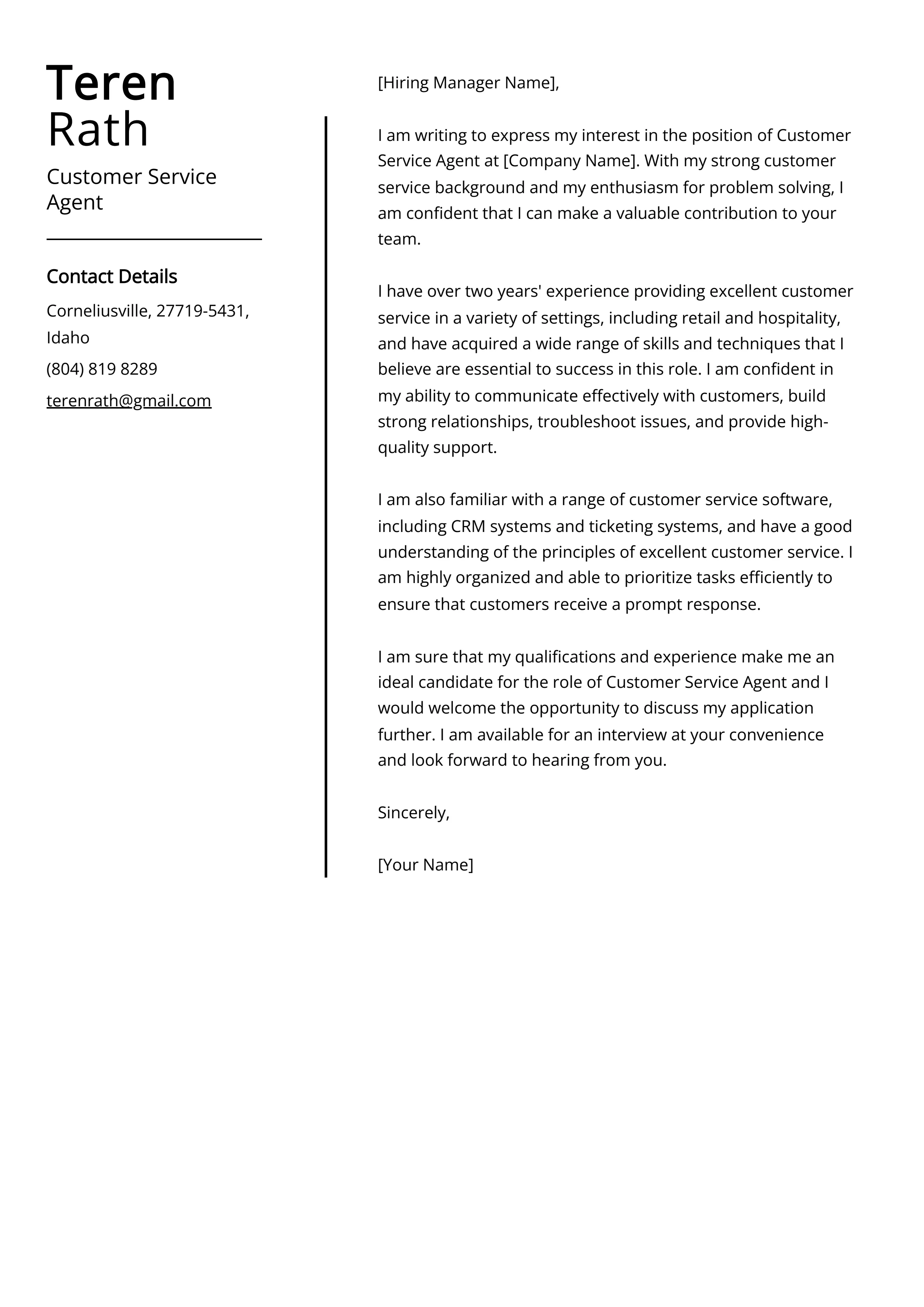
Airline customer service agents have a multifaceted role, with responsibilities extending far beyond simple ticket sales. They are the first point of contact for many passengers, providing information, assistance, and solutions to a wide variety of issues. Core responsibilities include checking in passengers and their baggage, assisting with flight changes and cancellations, and addressing customer inquiries about flight schedules, delays, and lost luggage. They also handle special requests, such as assisting passengers with disabilities or unaccompanied minors. Furthermore, agents are often responsible for managing passenger complaints, resolving conflicts, and ensuring compliance with safety regulations. The ability to work under pressure, maintain composure, and provide excellent service, even in challenging situations, is critical to success in this role. Agents also must be proficient in using various computer systems.
Essential Skills to Highlight in Your Cover Letter
When crafting your cover letter for an airline customer service position, it’s crucial to emphasize the skills that align with the job requirements. These skills demonstrate your ability to excel in this role. Focus on showcasing both soft and hard skills to create a well-rounded profile. Highlight your communication and interpersonal abilities, problem-solving skills, and customer service experience. Provide specific examples of how you have demonstrated these skills in previous roles. Also, mention your proficiency with relevant computer systems and any language skills, as these are highly valued in the industry. Your cover letter should paint a vivid picture of your capabilities and potential to succeed in a fast-paced environment.
Communication and Interpersonal Skills
Excellent communication and interpersonal skills are fundamental to success in airline customer service. You must be able to communicate clearly, concisely, and professionally, both verbally and in writing. This includes active listening, the ability to empathize with passengers, and adapting your communication style to suit different individuals and situations. In addition to clear communication, a customer service agent needs to be able to maintain a positive attitude, even when dealing with stressful situations or challenging customers. Building rapport, showing empathy, and using appropriate language are key to fostering positive interactions. Highlight any experience you have in conflict resolution or de-escalation techniques, as these skills are invaluable for managing difficult situations and ensuring passenger satisfaction. A strong command of language and the ability to remain calm are also essential.
Problem-Solving Abilities
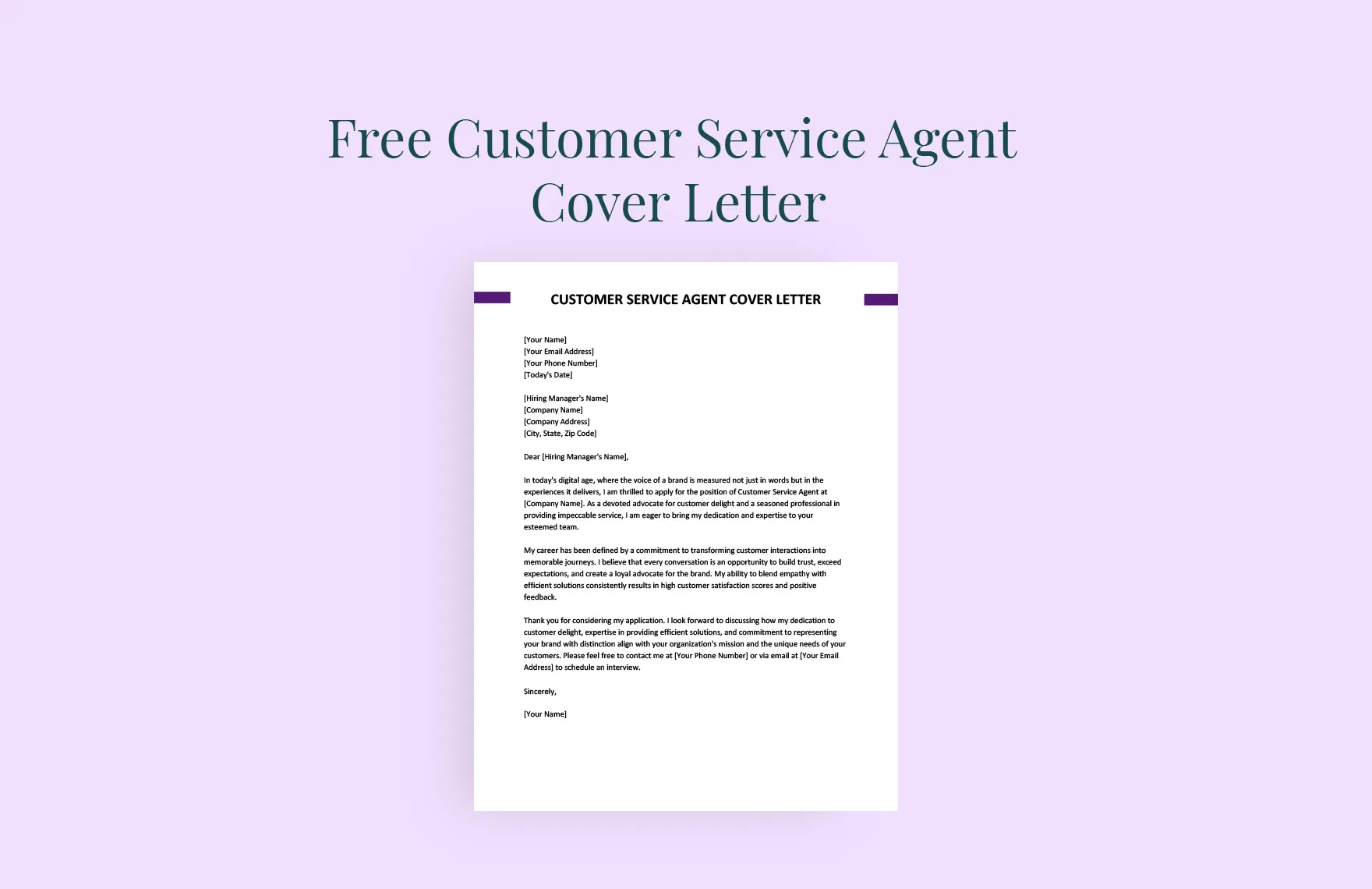
Airline customer service often involves navigating complex situations and resolving a variety of issues. Problem-solving skills are critical to address challenges efficiently and effectively. Your cover letter should highlight your ability to think critically, analyze problems, and develop effective solutions. Provide specific examples of situations where you have successfully resolved customer complaints, handled flight disruptions, or managed difficult situations. Describe the steps you took to identify the issue, gather information, and implement a resolution. Showcase your ability to remain calm under pressure, think on your feet, and make sound decisions. Emphasize your resourcefulness and ability to find creative solutions. Demonstrating these skills proves your ability to handle unexpected issues and ensure passenger satisfaction.
Customer Service Experience
Your cover letter should clearly showcase your previous customer service experience, which is a key element in landing an airline customer service position. Detail the specific roles you’ve held, the responsibilities you managed, and the achievements you made. Highlight experiences where you interacted with customers, resolved complaints, and provided solutions. If you have experience in a related field, such as hospitality or retail, be sure to highlight those transferable skills. When describing your experience, focus on quantifiable results. For example, mention how you improved customer satisfaction scores, reduced complaint rates, or increased sales. Provide examples of how you went above and beyond to assist customers and deliver excellent service. Your customer service experience is the foundation of your cover letter, so make sure you showcase it effectively and with precision.
Tailoring Your Cover Letter for Airline Applications
A generic cover letter simply won’t cut it. Tailoring your cover letter to each specific airline and position is essential for making a strong impression. Generic applications show a lack of genuine interest and effort, and can lead to rejection. Before you start writing, research the airline thoroughly. Learn about its values, mission, and culture. Review the job description carefully, paying close attention to the specific requirements and qualifications. Identify the key skills and experiences the airline is looking for and ensure you highlight those in your letter. Customize your letter to demonstrate your understanding of the airline’s brand and what sets it apart from its competitors. Use the airline’s name correctly throughout your letter, and tailor your tone and language to match the airline’s brand identity. This effort shows that you are genuinely interested in the specific airline and have taken the time to understand its needs.
Researching the Airline and its Values
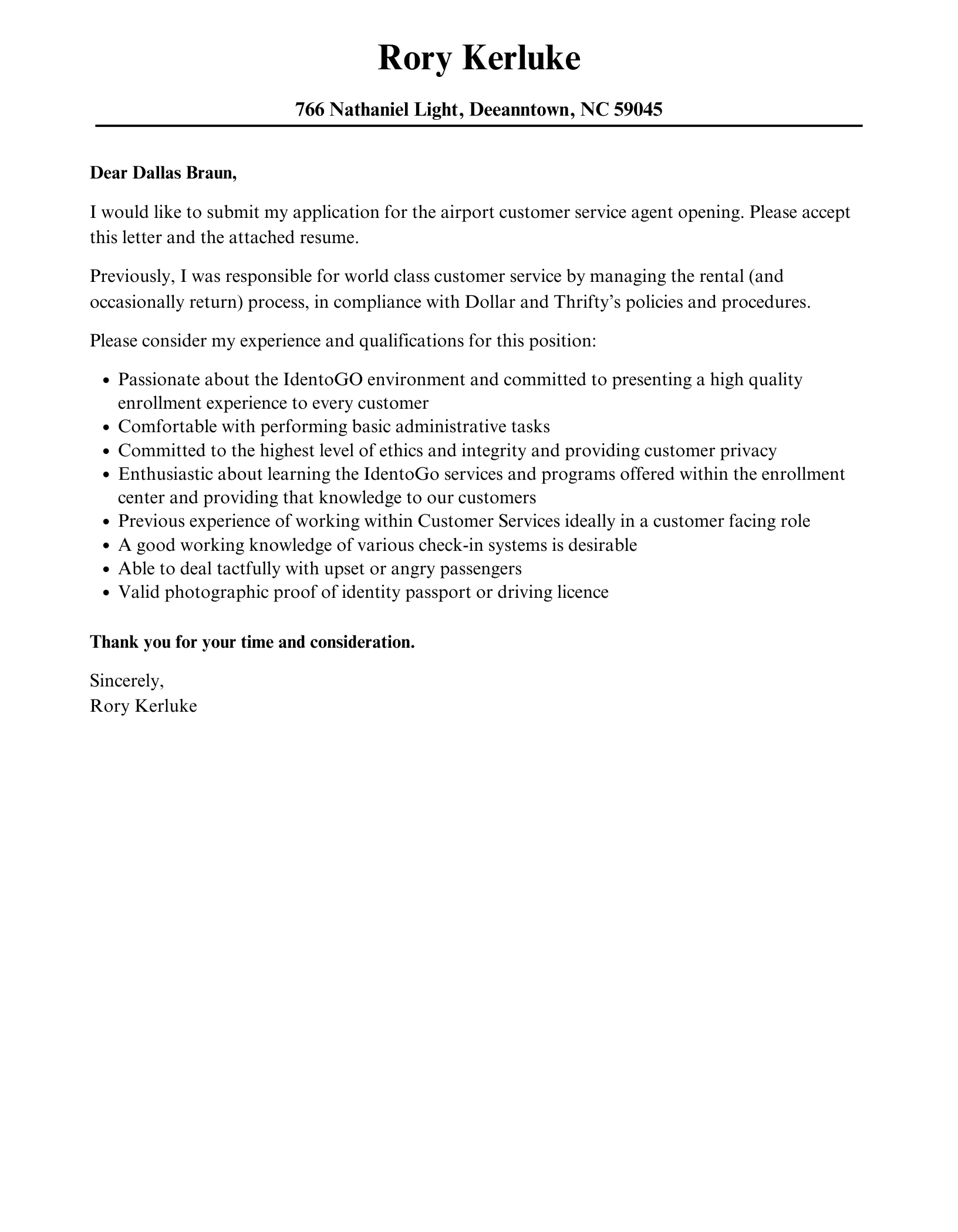
Before you write your cover letter, dedicate time to researching the airline. Visit the airline’s website, explore their social media profiles, and read any recent news or press releases. Understand the airline’s mission statement, values, and what makes it unique in the industry. Many airlines emphasize aspects like safety, customer satisfaction, innovation, or community involvement. Incorporate these values into your cover letter by demonstrating how your skills and experiences align with the airline’s priorities. For instance, if the airline values customer service, showcase examples of your excellent service and how you have gone above and beyond to assist customers. Showing you understand the airline’s culture is a strong way to impress the hiring manager, illustrating that you are a good match for the company and that you have genuine interest in the opportunity. Airline-specific knowledge can make your cover letter stand out.
Highlighting Relevant Experiences
When you are writing your cover letter, focus on the experiences that are most relevant to the airline customer service role. Emphasize your customer service experience, communication skills, and problem-solving abilities. Choose specific examples that demonstrate your success in these areas. Rather than listing generic job duties, describe situations where you went above and beyond to assist customers or resolve issues. For instance, you could talk about a time when you successfully handled a difficult customer complaint, resolved a flight delay, or exceeded customer expectations. Also, mention any experience you have with airline-specific software or systems. Highlight your ability to handle stressful situations, work well under pressure, and remain calm and professional. The more relevant your experiences are to the job requirements, the greater your chances of grabbing the hiring manager’s attention and securing an interview.
Quantifying Your Achievements
Numbers speak volumes, especially when it comes to showcasing your achievements in your cover letter. Wherever possible, quantify your accomplishments to demonstrate the impact of your work. Instead of saying “improved customer satisfaction,” state “increased customer satisfaction scores by 15%.” Instead of saying “resolved customer complaints,” state “resolved an average of 20 customer complaints per day.” These specific data points provide concrete evidence of your skills and abilities. Use percentages, numbers, and statistics to highlight your achievements in customer service, problem-solving, and other relevant areas. For instance, include information on how you reduced wait times, improved efficiency, or increased customer loyalty. This level of detail showcases your ability to drive results and can significantly enhance the strength of your application.
Structuring Your Cover Letter for Success
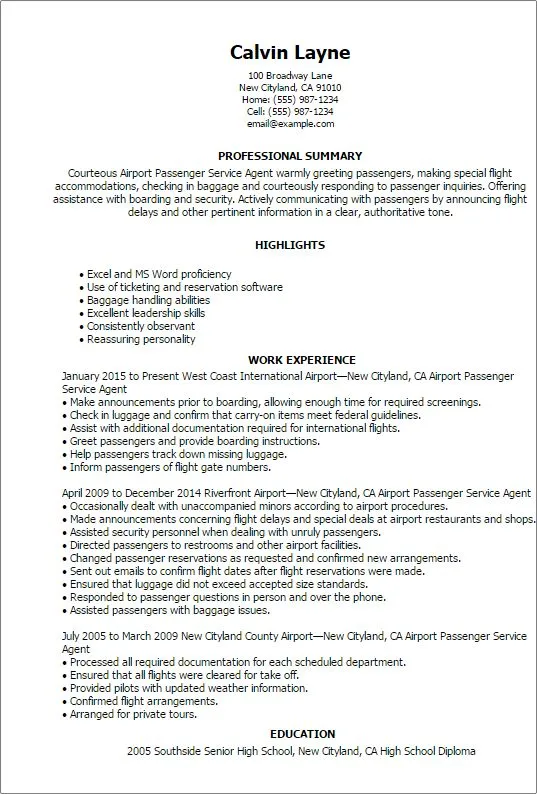
A well-structured cover letter is easy to read and presents your information in a clear, logical manner. Follow a standard business letter format, with a professional tone. Include your contact information at the top, followed by the date and the hiring manager’s name and title. The body of your letter should be divided into distinct paragraphs. This will help the reader easily understand your message. The opening paragraph should grab the reader’s attention and state your interest in the position. The following body paragraphs should showcase your skills, experience, and achievements. Use specific examples to illustrate your abilities. The closing paragraph should summarize your interest in the role and include a call to action, such as requesting an interview. Proofread your letter carefully to avoid any errors. A well-structured cover letter will get you noticed.
Contact Information and Salutation
Start your cover letter by including your contact information at the top. This should include your name, phone number, email address, and optionally, your LinkedIn profile URL. Ensure the contact information is accurate and up-to-date. Following your contact information, add the date, and then address the hiring manager by name if possible. If the hiring manager’s name is unknown, use a professional salutation like “Dear Hiring Manager” or “Dear [Department Name] Hiring Team.” Using the hiring manager’s name demonstrates your attention to detail and shows you’ve taken the time to learn about the company. Always maintain a professional and courteous tone throughout your cover letter, and use the right salutation to make a good first impression.
The Opening Paragraph Grab Attention
The opening paragraph is your chance to make a strong first impression and capture the hiring manager’s interest. Start with a concise and engaging statement that highlights your enthusiasm for the role and the airline. Briefly mention where you found the job posting, and then immediately state why you are a good fit. You might express your excitement about the opportunity and reference something specific about the airline that resonates with you, such as its values or a recent achievement. Avoid generic opening lines. Instead, clearly and concisely state your interest in the position. This paragraph should act as a hook, compelling the reader to continue reading and learn more about your qualifications.
Body Paragraphs Showcasing Your Skills
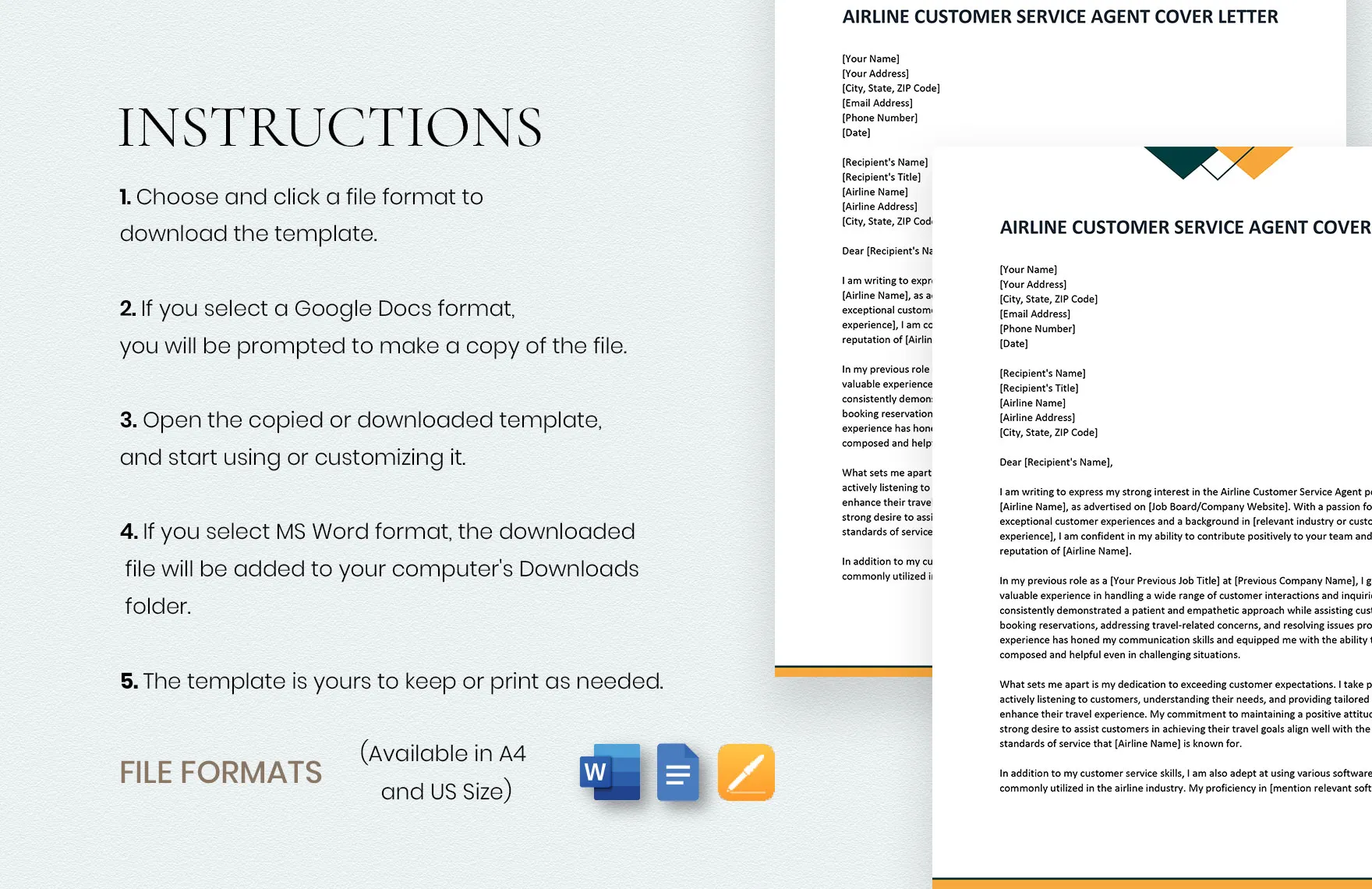
The body paragraphs of your cover letter should showcase your relevant skills, experience, and achievements. This is where you provide specific examples of how you have demonstrated your abilities in customer service and similar roles. Use the STAR method (Situation, Task, Action, Result) to structure your examples. Briefly describe the situation, the task you were assigned, the action you took, and the results you achieved. Quantify your achievements whenever possible, using numbers, percentages, or statistics to highlight your impact. Tailor these examples to align with the requirements and the airline’s values. This will prove your qualifications and make you a compelling candidate for the role. Ensure each paragraph has a clear focus and supports your key selling points. Remember to keep the tone professional and enthusiastic.
The Closing Paragraph Call to Action
The closing paragraph of your cover letter should reiterate your interest in the role and include a clear call to action. Briefly summarize why you are a good fit for the position, emphasizing your relevant skills and experience. Express your enthusiasm and eagerness to contribute to the airline’s team. Conclude by requesting an interview and providing your contact information again. Keep your closing concise and professional. For example, you might write something like, “Thank you for considering my application. I am excited about the opportunity to join [Airline Name] and contribute to your team. I am available for an interview at your earliest convenience and can be reached at [phone number] or [email address].” Always proofread your cover letter before submitting it, ensuring it is free of errors and tailored to the specific airline and role.
Proofreading and Formatting Your Cover Letter
Your cover letter’s proofreading and formatting are as important as its content. A polished and well-presented letter demonstrates attention to detail, professionalism, and respect for the hiring manager’s time. Before you submit your cover letter, proofread it meticulously for any spelling, grammar, and punctuation errors. Use a grammar checker, but also read your cover letter aloud to catch any awkward phrasing or sentence structure issues. Ensure your formatting is consistent, with a clear font, appropriate margins, and a professional layout. Avoid using excessive colors, fonts, or graphics. Ensure the letter is easy to read and visually appealing. If possible, have a friend or family member proofread your cover letter as well, as a fresh set of eyes can often catch errors you may have missed. Taking the time to ensure your cover letter is error-free enhances your chances of making a positive impression.
Common Mistakes to Avoid
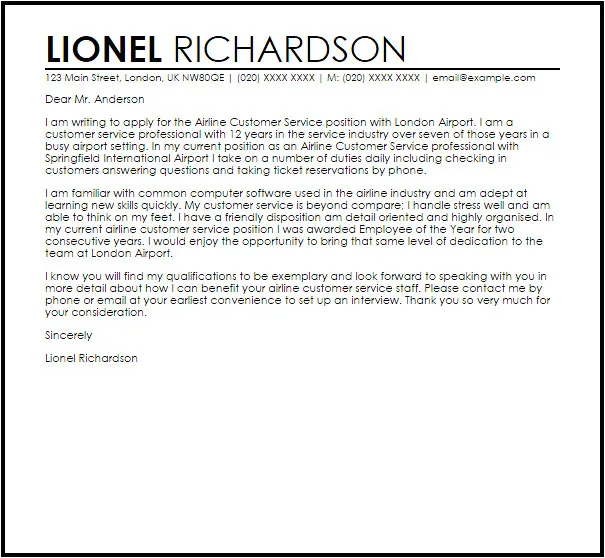
Avoid common mistakes that can detract from your cover letter and reduce your chances of getting hired. One major mistake is using generic language. Avoid writing generic letters that could apply to any job. Instead, tailor your cover letter to each specific airline and position. Another common mistake is focusing on yourself rather than the airline’s needs. While highlighting your skills is important, it should be done in the context of how you can benefit the airline. Other pitfalls include typos and grammatical errors, as these can reflect negatively on your attention to detail. Avoid including irrelevant information or repeating information that’s already in your resume. Finally, don’t use a negative tone or criticize previous employers. Always present yourself in a positive, professional manner.
Ensuring a Professional Appearance
Your cover letter’s visual appearance is just as important as its content. Presenting a professional cover letter includes using a clean, easy-to-read font such as Times New Roman, Arial, or Calibri, with a font size between 11 and 12 points. Use standard 1-inch margins on all sides. Ensure your letter is free of any formatting inconsistencies. Use appropriate spacing between paragraphs and sections for better readability. Use a professional email address. A well-formatted cover letter shows that you pay attention to detail and are serious about the job. Make sure your cover letter is visually appealing and easy to read.
